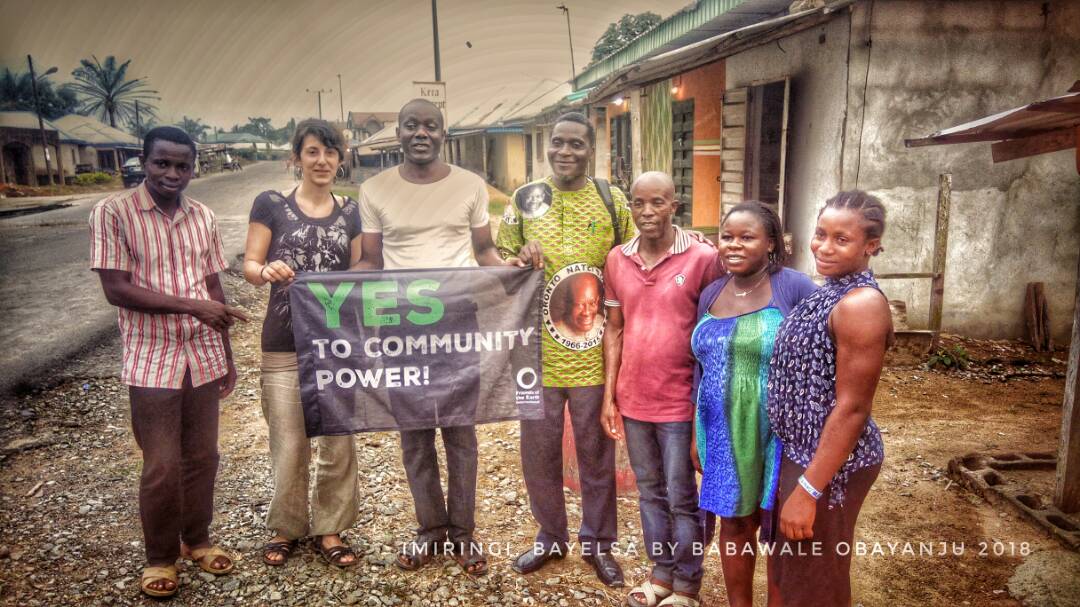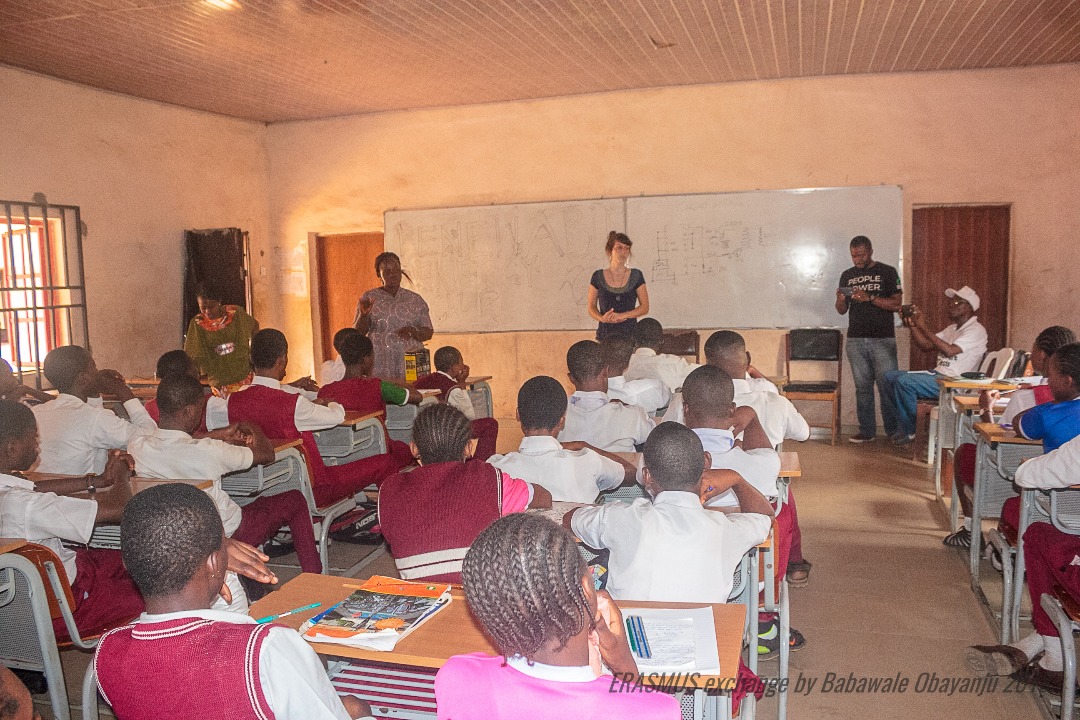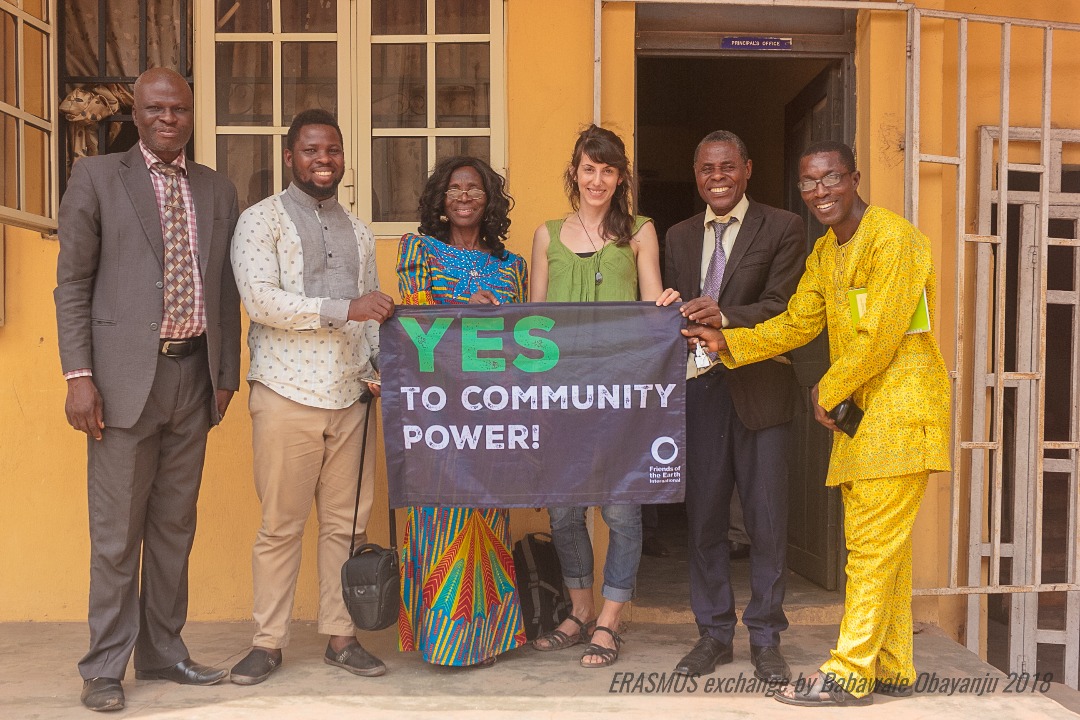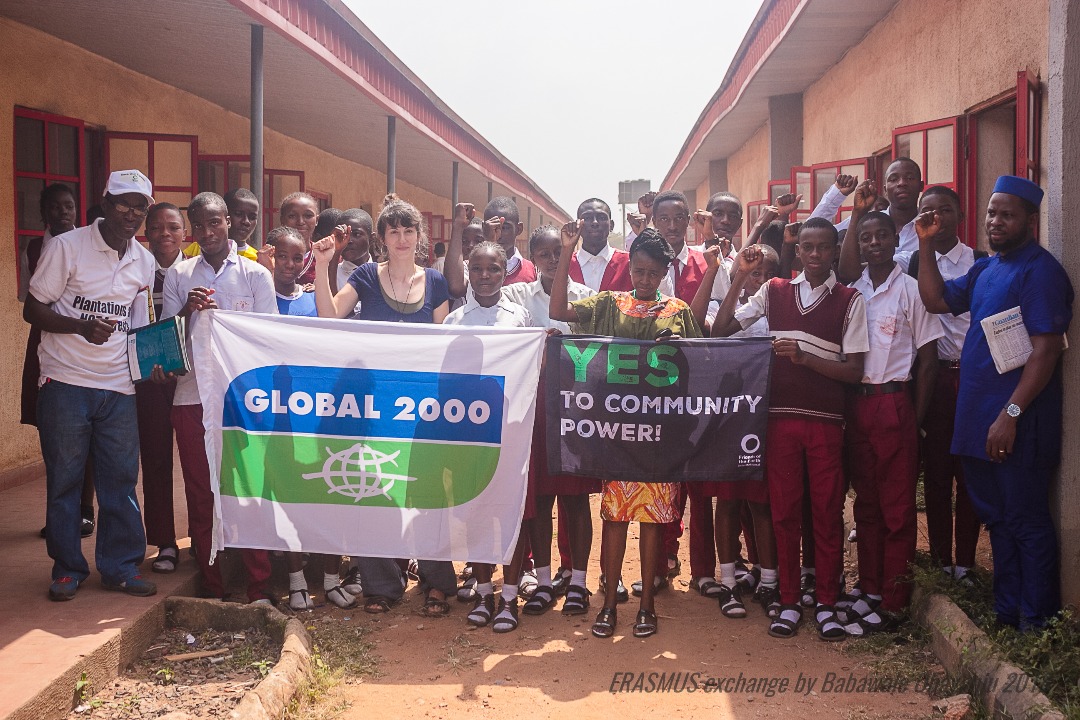Elena, from Global 2000/Young Friends of the Earth Austria, reflects on her visit to Environmental Rights action (ERA)/Friends of the Earth Nigeria. This exchange was part of a Friends of the Earth International project working to strengthen solidarity and collaboration between youth in Europe and Africa.
The 11 days I spent in Nigeria in the course of the project Fostering an Inclusive and Diverse Youth Environmental Movement Across Africa and Europe have been a very special and unique experience for me. Wale from ERA/Friends of the Earth Nigeria was my host and introduced me to the country and the staff members of ERA/Friends of the Earth Nigeria. During my stay I was able to visit three of the four ERA/Friends of the Earth Nigeria offices in Nigeria, in Lagos, Benin and Yenagoa.
In Lagos, ERA/Friends of the Earth Nigeria works on two big campaigns: One focuses on the public water sector, and campaigns to fix the city’s water crisis without privatisation. The second one is an anti-tobacco campaign, which among other things targets the tobacco industry’s targeting of school children. The Lagos office also coordinates the Women-Sanitary-Water-Network, which is active in different countries and aims to inform women – especially in rural areas – about the problems of contaminated water and water hygiene.

The headquarters of ERA/Friends of the Earth Nigeria is located in Benin city and the main topics here are renewable energy, climate change and climate justice. They also work on forests and biodiversity, as well as on a sustainable waste management project. The third place I went to was the Niger Delta Resource Center in Yenagoa, Bayelsa State. This ERA/Friends of the Earth Nigeria office is the starting point for going into the creeks and reporting on the numerous oil spills in the region and their consequences.
Visiting these places depends on the security situation at the time, because the locations are often in very remote areas of the Niger Delta.
ERA/Friends of the Earth Nigeria staff do not only inform the public of what is happening, but also go into communities to inform the people and offer their support for taking action. I had the chance to talk to Pst. Ranami Afagha from the Imiringi Community about the fight against big oil companies.

I also had the great honor to meet with King Bubaraye Dakolo and hear more about the struggles in Ekpetiama Kingdom and the health problems the people suffer from as a consequence of oil spills.
This is just a short overview of the people I met, the topics we were talking about and also the incredible and important work the people of ERA do.
The focus of my exchange was on environmental education and working with volunteers. I am a volunteer in environmental communication at Global 2000/Friends of the Earth Austria, which means that I go to schools and lead different workshops about climate change, food waste, and pesticides, amongst others. Therefore I was very curious about ERA/Friends of the Earth Nigeria’s work in environmental education. Currently there are two projects:
One of them are the Renewable Energy Clubs (REC) which was founded by ERA in 2014/15. It offers students aged 10–16 year the chance to engage in environmental issues. Generally students can freely choose to join one of the different club activities that are offered at their school. ERA saw the necessity and the potential to create a space were young people can learn more about energy and energy efficiency, climate issues, natural resources and the environment. The project was launched under the SPARE project (School Project for Application of Resources and Energy) which was founded by Norges Naturvernforbundet/Friends of the Earth Norway in 1996.

The impacts on people and the environment from oil and gas production (especially in the Niger Delta) is a big topic in Nigeria, and so it’s very important for young people to learn more about the alternatives of renewable energy.
Renewable Energy Clubs also offer space for curiosity and creativity because it allows the students to work on their own ideas. ERA/Friends of the Earth Nigeria staff join the clubs from time to time for practical demonstrations – for example, how to build energy-saving stoves with locally-sourced raw materials. They also distribute renewable energy equipment to the clubs after some trainings with the teachers. This means that the students can learn more about what it takes to generate solar power, and they are allowed to open up the different parts of the panels to get a better understanding and to stimulate their creative ability for innovative ideas.
When the Renewable Energy Club first began, a platform was created on how to introduce practical teaching of renewable energy in secondary schools. This brought together teachers and officials from the Ministries of Education, Environment and Energy. The project also supports the capacity building of the teachers through an initial training workshop to deepen their knowledge of dirty energy sources and the availability of renewable energy. The teachers can then transfer their knowledge to the students.

An overall goal of the Renewable Energy Clubs is that the students learn that everything is related and that human activity can have a negative influence on the planet. They promote the awareness of the availability of alternative sources of energy that are clean and supports and strengthen the students’ ability to acquire knowledge on maintaining, installing and creating simply renewable energy gadgets. The teachers at school help to coordinate the club, while the students elect an official among themselves (to ensure participation due to a responsibility for agenda setting of meetings and the organisation of the activities of the club). Currently there are six Renewable Energy Clubs in different Nigerian schools, with the aim to extend them to ten.
The second environmental education project is for students at university. They can participate in the Students Environmental Assembly Nigeria (SEAN) which was founded in 1993. After an inactive period ERA/Friends of the Earth Nigeria relaunched the SEAN in 2008. Currently there are 21 units in 15 states across the country. The aim of SEAN is to empower and activate students to become the leaders for environmental justice. They plan different activities like workshops, conferences, excursions, etc. In each institution there is one coordinator and from these one national coordinator is elected. At the national summit which takes place once a year, the 21 units share their ideas and draw up a plan for the next year, although they can choose their environmental issue independently.

During my stay in Nigeria, I had the chance to accompany Sunny, Joe and Wale from ERA to Renewable Energy Clubs at two different schools in Benin. I had the chance to hear more about what the students are doing. For example at the Ihogbe College a student called Japheth made an inverter system. When Wale heard of his work he offered to make a short video of him and his prototype so that they can present it to the government and maybe get support for his idea and build it for the school. I also could tell the students more about what we do for environmental education at Global 2000/Friends of the Earth Austria.
For me it was very important that the students are aware that there is a lot going on in the fight for climate justice and against climate change and that we need to be active everywhere and fight for our future. I also found it important to emphasise the importance of learning about the environment, the consequences of human activities and possible alternatives and to share the gained knowledge with others.

Currently there is no ERA/Friends of the Earth Nigeria program for young people after school or university to stay or to get active. I shared the experiences of the several volunteer programs we have at Global 2000/Friends of the Earth Austria and we were thinking about ideas to create a volunteer program for Nigeria considering the different circumstances of the countries.
I also experienced that working with volunteers is very different in Austria and in Nigeria. Generally the volunteers in the different programs of Global 2000/Friends of the Earth Austria are young people (most of them are students at university and many stay after graduating), primarily young women that donate their time (instead of money) to environmental protection. They often support the main campaigns of Global 2000/Friends of the Earth Austria with creative ideas, and they also plan public actions, projects, workshops, small events etc. on their own.
Most volunteer groups meet weekly or at least regularly in the Global 2000/Friends of the Earth Austria office to discuss and plan their activities. All volunteers can join a distribution list and get informed if support is needed for a campaign, event, demonstration etc. Therefore all volunteers that are active at the moment or had been active before can be reached and mobilised very quickly if necessary, which is a big support for the work of Global 2000/Friends of the Earth Austria.

Although in Nigeria there are possibilities for young people, like the Renewable Energy Club or the Students Environmental Assembly, where the latter does similar actions like in the volunteer programs of Global 2000/Friends of the Earth Austria, they are limited to students at school or university. There are hardly any volunteers outside this context. The big difference to Austria is that most of the people that get active in Nigeria are those who are affected directly! This means for example that they do not have access to energy, although the energy resources are taken from their land and the oil company on the other side of the street is illuminated at night, while the community gets dark after sunset. Or they suffer from food shortages because the fish they used to catch from the rivers (if there is any fish left) are poisoned because of the many oil spills from rusted and broken pipelines. Or they breathe air that is polluted from the oil and gas production and the responsible companies do not take any action.
It got very evident for me that the connection between environmental and fundamental human rights, like access to safe drinking water or a clean environment, is very strong in Nigeria – much stronger and much more obvious than in Austria. Many people and communities suffer from serious health problems and bad living conditions because of the strong and continuous destruction and poisoning of the environment they live in – and hardly any of the polluters or profiteers of the oil and gas production take responsibility for what they are doing.

I think that this circumstances that many Nigerians have to face lead to the differences in the working with volunteers and the way people get active. It’s not that there are no people affected directly by environmental problems in Austria, but my personal experience was that the dimensions differ greatly. I learned and I also could see that ERA/Friend’s of the Earth Nigeria’s work lies a lot in informing, encouraging and supporting people to fight for their rights and for healthy living conditions – this is COMMUNITY POWER!
Finally, as well as all the inspiring people I had the chance and privilege to meet and talk to, I had Wale on my side, an incredible person who introduced me to Africa. He took his responsibility very seriously and did a great job in not just showing me the variety among ERA/Friends of the Earth Nigeria’s work but also welcomed me to join his life, his family and his friends. His open and warm attitude made it possible for me to experience “real life” in Nigeria and I learned a lot about different cultures.

The last thing that I want to say is, that this journey – once again – made it very clear for me, that communication is the key. There are difficulties to understand each other even in the same country, the same culture and it is even more difficult between people from different cultures and with different backgrounds.
This means it is particularly important to talk to each other about issues, to identify our underlying and often differing understandings, feelings, and reactions to them.
And it’s also about being open and accepting different ways of living, without trying to convince other people that what you are doing is the only right thing. I think that many problems in the world are caused by misunderstandings – let’s keep this in mind and work on it!

